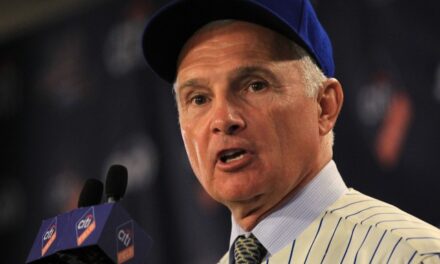
CHRIS PEDOTA, NORTHJERSEY.COM-USA TODAY NETWORK
The 2020 season is unlike any other baseball season. Over three months of baseball was missed, fans aren’t allowed in stadiums to watch, COVID testing is done constantly, and the number of media per game is limited. Baseball fans have their own perspective on this season — whether that be a positive one or a negative one.
But, what does someone who does get to go into the stadium, not to play, not as a fan, but as a beat writer, feel about this season? It’s an entirely different view (both literally and figuratively) than the rest of us. I spoke with Tim Healey of Newsday to find out.
- This season (and lack-there-of- baseball) has been tough on everyone. How in particular has it been tough for you?
It has been tough on me in that there has been no baseball to watch or cover and therefore I have been bored and had less work to do, neither of which I like. But I remind myself often: if boredom is the worst of it for me, then I’m doing OK. Lots of people have gotten sick. Lots more have lost their jobs. I have avoided those fates, so it is hard to complain.
- We all know that this season is different already, but tell us from your perspective how it’s different.
It is different for me in a lot of ways. It starts with my arrival at the ballpark: instead of just walking in and maybe going through a metal detector, this year at Citi Field there are stages. A member of the media 1) gets his or her bag sniffed by a dog 2) gets his or her bag checked by a human 3) goes through a metal detector 4) submits to a four-question health questionnaire about potential COVID-19 symptoms or contact 5) gets his or her temperature taken. And that is just to get into the building!
From there, reporters are limited to the press box, which sucks (although I understand the obvious reasons why). The clubhouse is closed to media, which makes it much more difficult for us to do our jobs (more on that below). And teams aren’t even allowed to do in-person socially distant press conferences or interviews. It’s all on Zoom.
For anybody keeping score at home: the president and the governor can conduct news conferences with reporters in the room, but Luis Rojas and Jacob deGrom cannot.
Pandemic baseball: The Mets are playing old footage of fans having fun in the stands between innings in an empty Citi Field. pic.twitter.com/qeJ5k4fDZn
— Tim Healey (@timbhealey) July 19, 2020
- What is it like being in the press box now?
Being in the press box isn’t all that different. There is more room, since reporters are more spread out, but other than that it is the same. Same seat and same view of the field, even if the stands are empty (which is something I don’t think I’ll get used to).
- What do you think the biggest challenge (as media) is going to be once the season starts?
The biggest challenge is going to be finding and reporting out stories that are different and interesting, so that we can attract readers/fans.
As any Mets fan who follows the beat writers closely enough surely has noticed, a lot of us had basically the same stories every day during camp. That is because our interviews are limited to who the Mets put in front of their Zoom camera, so we are at the mercy of the team significantly more than normal.
During normal circumstances, the clubhouse is open to reporters for about 50 minutes pregame and however long we need postgame. We also go on the field during batting practice. That gives us an opportunity to talk to players, coaches and other interviewees, observe how the individuals are behaving/interacting with each other and pick up on countless other small details that can be used in a story or even lead to an entirely new story. On off days especially, you tend to see each reporter come out with a story that is unique to them and/or their news oulet.
Now, it is much harder — but not impossible — to write something different from what everyone else is writing. These circumstances demand creativity and thinking outside the manager-and-clubhouse box, but maybe that isn’t a bad thing.
- What is something that fans don’t know that you’d like them to know?
I would bet that anybody reading this is a pretty smart fan, but there is a misperception among the general population/baseball fans that sportswriters are fans of the teams they root for. That is not true. Sometimes when I’m talking with a stranger about baseball — maybe about the Mets — and they ask if I’m a Mets fans, my go-to response is: “I’m not a Mets fan, but I follow them very closely.”
Not being a fan means I don’t care, really, if the Mets win or lose a given game. Of course, my job is easier — and probably more fun — when winning is more common, because there is lots to write about and the people I interview are happier. But overall, win or lose, my job is the same: write about the game and whatever other news popped up throughout the day.
All that said, I do frequently keep the perspective of fans in mind. Just like the players wouldn’t play if there were no fans, I wouldn’t be fortunate enough to write about baseball for a living if there were no readers. What do the fans care about? What might fans find interesting? Those are the kinds of questions I try to let guide my reporting and writing.
And one other thing that people tend to be surprised by: The work days are long! For a 7 p.m. game, I usually get to the ballpark by 3 p.m. — I like to make it 2:30 p.m. so I’m not rushed — and leave around midnight. I’m writing before, during and after every game, so there is usually minimal down time.
- What is the biggest obstacle the safety protocols present to a beat writer right now?
The biggest obstacle of the safety protocols is the access. It relates to what I wrote above about clubhouse access and finding different stories, but with no in-person interaction, it is much harder to build relationships. Good relationships with the people you cover are a critical part of beat writing, and the safety protocols — which, again, I understand on a temporary basis — make that virtually impossible.
- Are you worried about the travel between states to cover the team?
I am a little worried but not that worried. I’ll probably drive or take the train to a lot of places. In cities where the coronavirus numbers are bad/rising — Miami, Atlanta — I might play it safe and stay home, which my bosses are OK with.
- Have you had your eyes checked recently? (might come in handy being stuck in the press box!)
Haha glad you asked! Coincidentally, I did get my eyes checked in January. I got new glasses and a new contact lens prescription, so I was accidentally ready, in that sense, before the pandemic really hit. BUT, since I’m restrained to the press box, I’ve been bringing binoculars to work. They have proven very helpful.















